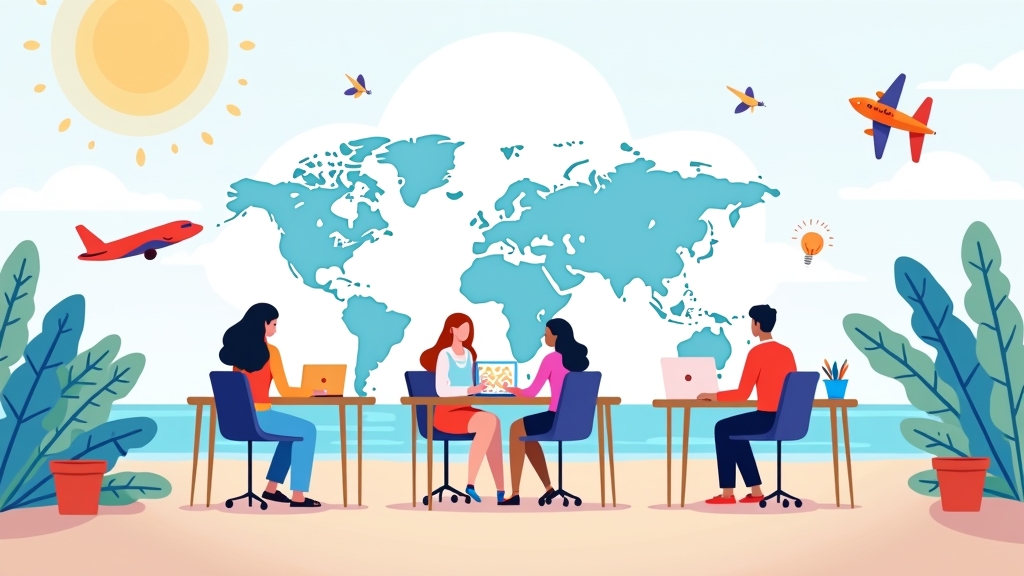The "Mobile Jobs" Revolution: How Professionals Are Building Location-Independent Careers
Imagine waking up on a beach in Bali, answering emails in the afternoon in a café in Lisbon and closing a contract in the evening for an apartment in Tokyo. Sound like a distant dream? For many professionals, this is already a tangible reality thanks to the rise of "portable jobs". This revolution is redefining not only how we work, but also how companies and global economies are structured.
The concept of portable work goes beyond the home office or occasional remote work. It represents a structural change in the relationship between professional and geographical location. It's not just about where you are, but how you build a career that can flow between cities, countries and continents without losing efficiency or opportunities. Platforms such as Upwork It is Fiverr have democratized access to global projects, while tools like Slack and Zoom have made collaboration without borders an everyday reality.
But what are the real impacts of this transformation? How is it shaping the future of work? And most importantly: how can you adapt to this new reality? We'll explore these questions in depth, from the motivations behind this revolution to the challenges and opportunities it presents.
What Defines a Mobile Job and Why It's on the Rise
Portable work is essentially any professional activity that does not require a fixed physical presence in a specific location. Designers, programmers, copywriters, consultants and even doctors (via telemedicine) are discovering that they can offer their services from anywhere in the world. The pandemic has accelerated this trend, but the roots are deeper: technological advances, cultural changes and the search for quality of life have driven this movement.
Why are so many professionals embracing this freedom? The answer varies. For some, it's the chance to escape long commutes and high living costs in big cities. For others, it's the opportunity to travel while maintaining a stable income. A Brazilian software developer, for example, can work for a German startup during the day and explore Lisbon at night - all thanks to a laptop and a stable internet connection.
Companies are also benefiting. With distributed teams, they can hire the best talent, regardless of where they are. A study by Global Workplace Analytics estimates that up to 30% of the global workforce will be remote by the end of 2023. This reduces office costs and broadens access to specialized skills.
Advertising
However, this freedom doesn't come without its challenges. Time zone differences, cultural barriers and the need for self-discipline are common obstacles. But for those willing to adapt, the rewards can be extraordinary.
Essential Tools and Skills for Working from Anywhere
Having a portable job requires more than just a laptop and Wi-Fi. Successful professionals in this model have mastered a specific set of tools and skills that guarantee productivity, efficient communication and time management. Platforms such as Trello It is Asana help organize tasks, while Notion works as a hub for notes, projects and even personal planning.
But tools alone are not enough. Skills such as asynchronous communication, time management and cultural adaptability are critical. Imagine having to explain a complex project to a client in Japan without a live meeting - knowing how to write clear emails and use video recording tools (such as Loom) makes all the difference.
In addition, portable professionals need to be proactive in building their personal brand. Platforms such as LinkedIn It is Medium make it possible to share knowledge and attract global opportunities. A freelance writer who publishes articles on digital marketing, for example, can attract the attention of companies in the USA or Europe without leaving home.
And what about taxes and contracts? Services such as Deel simplify international payments and labor compliance. Mastering these bureaucratic aspects is just as important as technical skills - after all, there's no point in signing a lucrative contract if you don't know how to receive payment securely.
Impacts on the Labor Market and the Global Economy
The rise of portable work is reshaping the global market in profound ways. Small towns and developing countries are becoming talent hubs, while traditional metropolises face pressure to adapt. A qualified professional in the interior of Brazil now competes (and often wins) against candidates from São Paulo or New York.
Companies are rethinking hierarchical structures. Why limit hiring to a 50 km radius from the office when you can have a diverse team spread all over the world? Startups like GitLab operate 100% remotely from the start, showing that it is possible to scale businesses without a fixed physical address.
But there are also side effects. Salaries are becoming more competitive globally. A software engineer in India can charge less than a colleague in the US for the same work, putting pressure on salary ranges in developed economies. On the other hand, professionals in countries with a low cost of living gain access to previously unattainable salaries.
And the cities? Some are repositioning themselves as destinations for digital nomads, offering special visas and infrastructure. Portugal, with its seen D7and Estonia, a pioneer in the e-residencyare examples of how governments are attracting this new class of workers.
Common Challenges and Pitfalls (and How to Avoid Them)

Geographical freedom is seductive, but it's not a bed of roses. Isolation, difficulty in establishing boundaries between personal and professional life and financial instability are real risks. Without office colleagues or a supervising boss, many struggle to maintain productivity or avoid burnout.
How do you get around these problems? Structured routines are essential. Setting fixed working hours, even if they are flexible, helps to create discipline. Tools such as RescueTime monitor productivity, while mindfulness apps (Headspace) help with mental balance.
Another challenge is income inconsistency. Freelancers and remote contractors often face lean periods. Building up a financial reserve and diversifying sources of income (such as online courses or memberships) can cushion these impacts. Platforms such as Udemy make it possible to monetize knowledge, creating passive flows.
Finally, there is the legal issue. Working for clients in multiple countries can complicate tax returns. Consult an accountant specializing in international income or use services such as Remote to manage contracts is a smart solution.
The Future of Mobile Work and Emerging Trends
Where is this revolution taking us? The integration of virtual reality (VR) and metaverse in remote work is already beginning. Platforms such as Sococo recreate virtual offices, while the Oculus allows for immersive meetings. In a few years, "going into the office" may mean putting on a headset, not taking a train.
Another trend is the growth of coliving spaces - shared housing for digital nomads. Companies like Outsite offer accommodation with fast Wi-Fi and workspaces in cities such as Bali and Barcelona. These environments combine geographical freedom with community, combating isolation.
In addition, the demand for hybrid skills (technical + interpersonal) will increase. Professionals who master programming It is communication or design It is project management, will have an advantage. Courses on platforms such as Coursera help develop these skills.
What about companies? Many are adopting "remote-first"where attendance is optional. A Dropbox has announced that it will no longer have traditional offices, opting instead for flexible spaces. This mentality should spread, redefining what it means to "go to work".
How to Start Your Own Portable Career
Ready to embark on this journey? The first step is to assess your skills and identify which ones are "portable". Areas such as digital marketing, software development, translation and graphic design are naturally adaptable, but even traditional professions (such as teaching or consulting) can adjust.
Next, build a solid portfolio. If you're a copywriter, create a blog or publish on Contently. Designers can use the Behance to exhibit their work. A profile on Toptal or PeoplePerHour connects you to global customers.
Networking is also crucial. Join online communities such as Nomad List or Facebook groups for freelancers. Many opportunities arise from referrals - being visible in the digital ecosystem increases your chances.
Finally, test before you dive in. Try working remotely for a week, either from a local coworking space or from another city. Use this period to adjust routines and identify gaps. The transition to portable work is a marathon, not a sprint - start slowly, but start.
Conclusion: An Unprecedented Opportunity
The portable work revolution isn't a passing fad - it's a structural redefinition of the concept of career. It offers freedom, but demands responsibility; it opens global doors, but requires constant adaptation. For those willing to learn and reinvent themselves, however, the possibilities are endless.
What about you? Have you ever wondered how your professional life could be different without geographical ties? The world is becoming your office - you just have to decide how you're going to occupy it.
Want to take the first step? Explore platforms like RemoteOK to find vacancies or start planning your transition today. The future of work isn't coming: it's already here.



